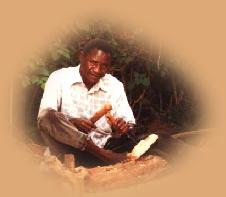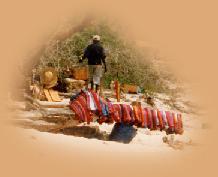About Us
Safariing
Travelling
Accommodation
Equipment & Gadgets
Souvenirs
Clothing
Safari Activities
Coastal Activities
Security
Health
Where
When
Experiences
Slideshows
Evolution
Contacts
Site Map
Sub Site
|
| | | |
Souvenirs
|
You can't go on a once-in-a-lifetime holiday without taking home a memento. But with increasing import/export restrictions throughout the world your keepsake must be chosen carefully. Just because somebody has a nice article for sale doesn't mean you are able to take it home! This can be particularly so when travelling to Africa.
Here are just some of the points you need to consider :
- We are all aware of the restrictions on ivory as they've been given a lot of publicity, but the other materials may also be banned: rhino horn, often used in knife handles; leather goods, such as belts; hides, used for decorative shields; hard woods, used in many carvings - especially ebony; feathers; shells; tortoise shells.
- Restrictions on aircraft, such as: overall weight - an ebony rhino can be extremely heavy; metallic spears, particularly since the clamp-down on sharp objects; oversized carvings, can't be packed in luggage for the hold and will not go in overhead lockers, e.g. 6ft giraffe. Different airlines may adopt different policies and therefore bans can be imposed at any point in your journey.
- Customs officers can be particularly pernickety. If they are in doubt you may have to pay a lot of duty, have the item confiscated or, even be prosecuted for trading in banned goods. That'd certainly give you a reminder of your holiday!
- Often customs officers may ask you for a 'gift' for themselves. This is forbidden and can be seen as bribery. Hold your nerve and decline politely.
- Customs often have superior powers to the police. This has certainly been shown in the U.K. in recent years, where vehicles have been impounded and sold just because the customs officials decide the quantity of duty paid goods exceeds own consumption limits.
- You may pass through many customs checks before returning home and any of them may impose restrictions - not just your points of departure and destination.
|
 |
|
|
Bargaining
|

Wood carver, Naivasha.
22nd Dec. 1994 |
Don't be fooled, many carvings are mass produced and although the seller may plead he's spent many days producing his high quality unique carving he may simply have rubbed it down and polished it!
Bartering is common. This could be a straight money transaction, but could also involve exchange of t-shirts, training shoes or even the driver's 3 day old plums! Experienced travellers are even known to take old clothing they are about to throw out to exchange for a bargain. They are all currency of one form or another.
Remember many of the roadside traders are eking out an existence below the poverty line. Unemployment is high and they have no social security to fall back on. So in this eco-aware world we all now live in be prepared to offer them a fair price.
Don’t rush to buy the first spear etc – you’ll come across the same items time and again. Remember once you’ve bought a gift, you have to carry and look after it throughout the rest of your safari and your fellow passengers may not cherish sharing their cramped mini-bus with a tribe of Masai warriors!
|
|
Hawkers
|
Don't worry about where you can get that special souvenir - the hawkers will usually find you! Having said that the Tanzanians are a little less forceful and more polite than the more hardened Kenyans.
Your first few encounters with the hawkers can be both enlightening and entertaining, but their determination can be wearing, especially after long safari drives. They will be around wherever you stop, at roadside viewpoints & picnic sites, outside banks, in town, and particularly at the entrances to the safari parks. The last location can be somewhat daunting as the drivers are usually arranging your park entrance tickets leaving you on your own. Once you’ve had enough close the windows and don’t catch their eyes. If you're desperate you could try a little Swahili phrase 'Hakuna pesa', which means 'I have no money'!
|
At the beach and around town you maybe approached by a local 'friend'. This is usually a forerunner of some sales pitch. Be wary of giving your name and particularly address. You may be pestered by unwarranted correspondence or find you have been given as a reference for a visa application! You may have to be forceful in your rebuttal to the point of rudeness.
Note, hawkers and traders are rarely welcome in hotel grounds and you may find a little pocket of them waving you over just outside the gates or at the edge of the beach. |

Beach trader, Watamu.
6th Jan. 2000 |
As in any society the lowliest do not have the wherewithall to forge out a living and in similar locations you will come across beggars. They are not below social blackmail and often a haggard looking woman with a snotty-nosed infant on her hip will be found begging for money. Everybody has to look to their own conscience how to deal with such encounters.
In similar locations you'll often get young children asking for pens. On the face of it this seems an unusual request until you realise they have to provide their own reading and writing materials before they can attend school! I don't know anybody who would deliberately deny someone an education! Alison usually gathers up all the freebie pens from her conferences and has a couple of boxes ready to take with us by the time our holiday comes round. |
|
Other Trading Outlets
|
- The next grade up from the hawkers are the street traders offering the same type of goods but from small lock-up stalls.
- In the larger towns similar stalls are often grouped together in a market area. If your schedule allows you can commission particular crafts to your own design. Be aware the stallholders language skills are not the best (otherwise they would be earning a living in hotels or guides which are far more lucrative) and so what you actually get may not be what you thought you ordered. A friend of ours once ordered a measuring stick with a horse's head on, only to return the following week to pick it up, perfectly as described, except the head was stained with zebra stripes! If you are in any doubt, simply stick to what's already on offer. As an eco-tourist you should pay for any commissioned items, whether you think it is suitable or not as the trader will have difficulty selling it on. In the world of communication any breakdown is equally to be blamed on both parties.
- The second most common outlet you'll be introduced to is the roadside curio shop/café/toilet stop. Your driver will probably have suggested he knows an outlet run by his 'cousin' or 'brother' where you'll get good rates. This is more likely to be an arrangement where he is paid or offered free refreshment to bring you there!
- All lodges and hotels have a souvenir shop, but offer little scope for negotiation.
- The next outlet is the souvenir shop, established in common shopping areas within towns. Here you can still barter, but expect to pay a bit more as they obviously have larger overheads. They may well also offer to arrange shipment home. Make sure you pay by credit card, as the article may never arrive and you're not in a position to complain to the storekeeper. But it may not be his fault. Items regularly get lost in the post or the article may have been blocked at customs. This isn't solely a third world problem. Many years ago I arranged for a box of cigars to be shipped home from the States as a present to my father and they never arrived. I did get a full refund from the credit card company though.
- Finally, if you really have forgotten that essential present or souvenir you have the outlets in the airport's duty free area. These are less likely to offer bargains or negotiate prices, as they know you have little other choice. They make their money from the compulsive shopper who has little to do for hours at a time before their flight!
|
|


